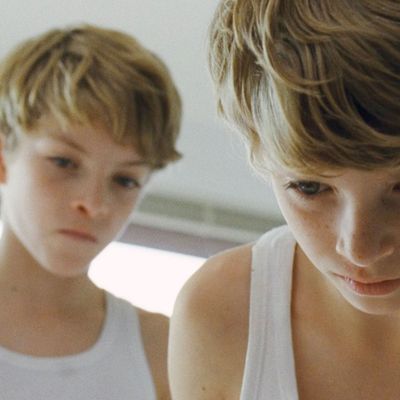
After making waves on the festival circuit, the Austrian psychological horror film Goodnight Mommy opened quietly in limited release way back in early September. Since then it’s managed to stick around in theaters, and makes its VOD debut before appearing on DVD and Blu-ray next week. So now’s a good time to take a look at this tense, inordinately disturbing movie, which has divided many critics. Some find it an admirable, artful entry into the horror genre, while others consider it manipulative torture porn.
One could say that Veronika Franz and Severin Fiala’s film is a Gothic thriller set in a modernist milieu. The house in this case is not an ornate, ancient mansion, but a sleek, remote affair filled with hard angles and blank spaces, surrounded by cornfields and mudflats and caves. Shot with ominous precision, the setting makes for an unnerving playground for 10-year-old twins Lukas and Elias (played by real twins Lukas and Elias Schwartz), who spend their days bouncing on trampolines, swimming in the lake, running through the woods, and exploring the piles of skulls stacked inside local catacombs. (You know, kid stuff.)
The mysterious “figure in the attic” this time is Mother (Susanne Wuest), who has just arrived from the hospital with her face wrapped in bandages – for what reason, we’re not quite told, beyond a passing reference to an “operation” that’s clearly cosmetic in nature – and who has a strange, tense relationship with her children. There’s no warm greeting from the boys upon her arrival. She’s sometimes bossy, sometimes dependent and vulnerable. Mostly remaining indoors, mother demands silence around the house. She doesn’t even speak to Lukas, or feed him. The boys, when alone, wonder about what’s changed in her, and whether she’s even their mother. Is that an impostor beneath those bandages? But the boys themselves display a certain coolness that suggests they’re far from innocent: Franz and Fiala shoot them like a cross between the two girls from The Shining and the two young psychos from fellow Austrian provocateur Michael Haneke’s Funny Games.
This tension and uncertainty persists for most of the film, capturing the minute push-pull of the three characters’ interactions. A game of “Who Am I?” goes off the rails when the boys choose “Mama” as the person whose identity she has to guess, and she seems to get basic details about herself wrong. But could she be doing it on purpose? Her questions and responses seem angry rather than clueless. The house is dominated by blurry pictures of mother on the walls, which enhances the overall mood of incompleteness, of characters whose real natures remain unknown. The focus on games – childhood games, board games – make us wonder if a bigger psychological game is being played here. But it’s also hard not to feel like the action is unfolding under the shadow of some unseen, unspoken past trauma.
Goodnight Mommy is a film filled with ellipses, with pointed silences – and it works better when we read into those silences. Here, I will have to get into some mildly spoiler-y territory: The film contains, near the end, what in many other stories would be presented as a twist. It’s a revelation that seems quite evident fairly early on, however. (I’m terrible at guessing twists, and it was pretty clear to me, even though I didn’t even know the film had a twist.) In my case, having some idea of where it was all headed actually enhanced my appreciation of the film, giving the proceedings an aura of melancholy and recovery instead of menace. Yes, it made the third-act descent into extremely grisly violence even more unsettling. Still, I couldn’t help but sense a kind of muted, helpless compassion behind all that cruelty – more tragic than sadistic. Goodnight Mommy is a very disquieting, very suspenseful film, but proceed with caution.


